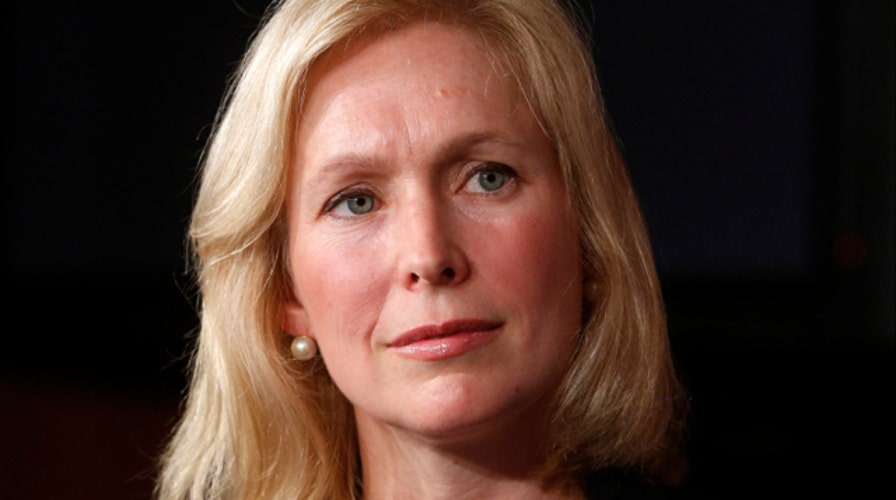Kirsten Gillibrand has kicked up a fuss over sexual harassment—or perhaps sheer stupidity—by some of her male colleagues on the Hill.
And that will undoubtedly help her sell her new book.
But why doesn’t she name them?
If these elected representatives of the people are engaging in boorish and inappropriate behavior, shouldn’t the voters know about it?
Some female journalists, too, are saying they have had to put up with sexist comments, but without naming names.
Now I don’t want to pretend that there’s a clear path here. Many women in the workplace have to put up with a wide variety of off-color jokes, crude remarks, unwanted touching and outright harassment. If they complain about the lesser stuff, they can unfairly be branded “difficult.” They don’t want to appear humorless about a little teasing. And they don’t want to derail their careers if they can brush off the intrusions or convince the offending males to back off.
After all, what if Gillibrand named and shamed a fellow senator and he turned out to be the deciding vote on some bill she wanted to pass?
But no one forced the New York Democrat to raise the issue in her book, “Off the Sidelines.” Or to talk about it to People magazine. So she’s the one who put the issue in play, knowing it would generate buzz.
According to the senator’s account, one older male colleague said: “Good thing you’re working out, because you wouldn’t want to get porky!” Her response: “Thanks, a—hole.”
A southern congressman once held Gillibrand’s arm while walking her into the House chamber, saying: “You know, Kirsten, you’re even pretty when you’re fat,” he said. (“I believed his intentions were sweet, even if he was being an idiot.”)
The worst example occurred after Gillibrand had a baby and eventually lost 50 pounds. An older senator approached her from behind, squeezed her waist and declared: “Don’t lose too much weight now. I like my girls chubby.”
The Gillibrand story prompted some observations from female correspondents. NBC’s Andrea Mitchell said: “I covered the Senate in the late ’80s and ’90s and we all had our stories of whom you’d not get in an elevator with and whom you’d protect your young female interns from.”
CNN’s Dana Bash told viewers that “I haven’t had comments like that, but after I had my son three years ago, I got some comments that would maybe blow you away from male senators, maybe not realizing that they were saying inappropriate things, but talking about, you know, getting my figure back and things like that.”
So some of this misbehavior is an open secret on Capitol Hill. I understand journalists not wanting to blow the whistle and become the story, but it can’t be comfortable to be holding back information that could “blow you away.”
Which brings me to Bob Packwood.
Three weeks after the Oregon senator was reelected in 1992, the Washington Post published a lengthy investigation into how he had made unwanted sexual advances to at least 10 women, including former staff members and lobbyists. “Several said he was abrupt, grabbing them without warning, kissing them forcefully and persisting until they made clear they were not interested or had pushed him away.”
One staffer quit after Packwood followed her into a room and grabbed at her clothes. The Post drew flak for not running the story before the election, but editors said it was not ready for publication.
Packwood resigned nearly three years later when threatened with Senate expulsion.
The Post story was embarrassing to the Oregonian, which had been investigating the rumors, and it turned out the Portland paper was sitting on some important information. One of its own reporters, Roberta Ulrich, had been kissed on the lips by Packwood after an interview eight months earlier.
Ulrich “told two senior editors but asked the men to ‘be careful about whom they told the story to’ because she felt embarrassed,” according to American Journalism Review. The Oregonian’s editor was not informed.
Ruth Marcus disagrees with the notion of Gillbrand going public:
“How do you think this would go if she exposed them to public ridicule?” she writes in her Washington Post column. “Even gently chiding them in private would be risky; I imagine the male senator ambling away, muttering something under his breath that rhymes with witch. We all face trade-offs between calling out bad behavior and doing our work effectively.”
Patty Murray kept quiet about another Senate elder. The Washington Post’s Karen Tumulty reports:
“As recounted in journalist Clara Bingham's 1997 book ‘Women on the Hill,’ Murray found herself alone in an elevator one evening with 91-year-old Sen. Strom Thurmond, R-S.C., who did not recognize her as a colleague. He inquired whether the ‘little lady’ was married -- and then proceeded to grope her breast… Bingham wrote that the outraged Murray had confided the incident to her colleague and fellow Class of 1992 senator, Barbara Boxer, D-Calif., who laughed it off.” (Boxer's office says that is wrong, was based on a pre-publication copy and that the California senator urged Murray to go public.)
What Packwood and Thurmond did was far worse than anything Kirsten Gillibrand is alleging. If she wasn’t all that upset about what those lawmakers said to her, that’s her call, although publicizing it without naming them is like being a little bit pregnant. Sometimes lawmakers are protected by a conspiracy of silence.





